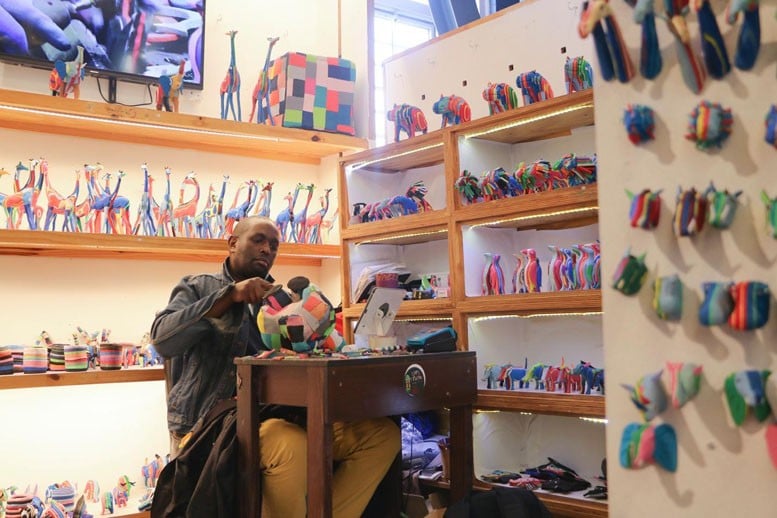
In Cape Town’s Watershed Market, the vibrant colours of Davis Ndungu’s animal sculptures made out of discarded flipflops are a delight to behold

The founder and creative genius behind Flip Flop Sculptures, Davis Ndungu sat in his colourful studio-cum-outlet full of animals crafted by him when I met him recently in Cape Town. His studio is in the fashionable Watershed Market located at V&A Waterfront precinct.
The inventive modern design of an old warehouse -- Watershed -- on the waterfront of the Atlantic Ocean provides the local entrepreneurs a permanent and upscale market in this vast light-filled space. The Watershed is a lively shopping place that has close to 150 shops selling art, handicrafts, ceramics, textiles, jewellery, leather bags, clothing, toys, etc. It also has juice bars and cafes, tarot card readers, live entertainment in the evening hours as well as exhibition and workshop spaces, and wellness facilities.
After experiencing proximity with wild animals on safaris in the bush and later seeing their replicas, mostly in wood, in shops and with hawkers in Cape Town, the eye-catching vibrant colours of Ndungu’s animals are a delight to behold.
Davis Ndungu’s Recycled Flip Flops Studio (RFFS) is not only creating animal sculptures but also playing its part towards creating a cleaner and more sustainable world.
He outsources the collection of rubber shoes and flipflops from dumpsters and those found washed up on the beaches of South Africa. Old footwear is Ndungu’s choice of raw material. He buys these by the sacksful after they are cleaned in a solution of bleach and vinegar. For him, it is important to keep the polyurethane rubber out of the oceans, and at the same time provide people with employment in communities that most need it.
He makes his selection, and after cutting and gluing the flipflops into blocks, he sets out to work. His repertoire consists mostly of animals, but you can also find key rings, tortoise-shaped doorstops and African masks at his outlet. He also sells online within the country.
Ndungu is a skilled sculptor. I stand watching his dexterous hands as he carves out a brightly coloured elephant from a block of old, discarded flipflops while continuing to talk to me. Ndungu had used wood before he started using flipflops. "I just changed the medium," he smiles. He knew how to carve wood, so after he assembles the flipflops together into one large block, he uses a sharp steak knife and sandpaper to do the job.
He says that his choice of material in combination with his craft and the appreciation he has been getting from all around gives him a lot of satisfaction. His part in building a positive foundation for a sustainable impact is by no means small. Discarded footwear is one of the major hazards of oceans around the world. By recycling and repurposing them into stunning animals, Ndungu is doing a great service to the marine life by preventing the toxic non-biodegradable material from reaching them.
The danger to the oceans from plastics and polyurethane is no small threat. As we know, polyurethane is artificial rubber. These urethanes combine the strength of rigid plastics with the elasticity of rubber. In the oceans, from the tiniest planktons to the largest whales, none are safe from plastics. Apparently there are more than 51 trillion pieces of microplastic in our oceans, contaminating the seas and even affecting volcanoes.
Ndungu is trying to keep away from the ocean all the flipflops that he can, and give them a new life. Instead of becoming a pollutant, the flipflops animal sculptures become something to be admired and played with. His helpers assist him in larger projects, but essentially Ndungu is passionate about working on his pieces by himself from start to finish. He has been doing this work since 2006, and sells about 500 pieces a month. The RFFS not only ensures sustainability of the business and working practices but also endeavours to protect and promote African wildlife and cultural legacy.
Sometimes Ngundu gets large commissions. For example, he had to assemble a life-sized lion that took up about 800 flipflops. The project took him three months to complete but the work done in the first two weeks had to be abandoned as the animal could not stand. Working with flipflops as his only raw material has its challenges, but he perseveres and makes his full-size animals stand, no matter how long it takes.
As I looked around, I could see the vibrant, quirky, lightweight and unbreakable herds of antelopes, elephants, rhinos, giraffes, groups of warthogs and hippos, a pride of lions… all the iconic African animals in multicolours, ready and waiting on the shelves to be picked up by appreciative shoppers.